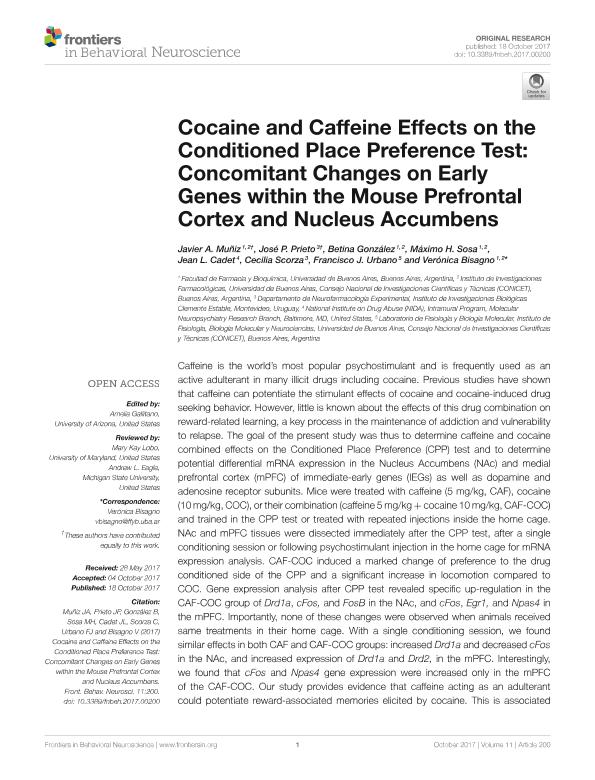Artículo
Cocaine and Caffeine Effects on the Conditioned Place Preference Test: Concomitant Changes on Early Genes within the Mouse Prefrontal Cortex and Nucleus Accumbens
Muñiz, Javier Andrés ; Prieto, Julián José; Gonzalez, Betina
; Prieto, Julián José; Gonzalez, Betina ; Sosa, Máximo Hernán
; Sosa, Máximo Hernán ; Cadet, Jean L.; Scorza, Cecilia; Urbano Suarez, Francisco Jose
; Cadet, Jean L.; Scorza, Cecilia; Urbano Suarez, Francisco Jose ; Bisagno, Veronica
; Bisagno, Veronica
 ; Prieto, Julián José; Gonzalez, Betina
; Prieto, Julián José; Gonzalez, Betina ; Sosa, Máximo Hernán
; Sosa, Máximo Hernán ; Cadet, Jean L.; Scorza, Cecilia; Urbano Suarez, Francisco Jose
; Cadet, Jean L.; Scorza, Cecilia; Urbano Suarez, Francisco Jose ; Bisagno, Veronica
; Bisagno, Veronica
Fecha de publicación:
10/2017
Editorial:
Frontiers Research Foundation
Revista:
Frontiers in Behavioral Neuroscience
e-ISSN:
1662-5153
Idioma:
Inglés
Tipo de recurso:
Artículo publicado
Clasificación temática:
Resumen
Caffeine is the world's most popular psychostimulant and is frequently used as an active adulterant in many illicit drugs including cocaine. Previous studies have shown that caffeine can potentiate the stimulant effects of cocaine and cocaine-induced drug seeking behavior. However, little is known about the effects of this drug combination on reward-related learning, a key process in the maintenance of addiction and vulnerability to relapse. The goal of the present study was thus to determine caffeine and cocaine combined effects on the Conditioned Place Preference (CPP) test and to determine potential differential mRNA expression in the Nucleus Accumbens (NAc) and medial prefrontal cortex (mPFC) of immediate-early genes (IEGs) as well as dopamine and adenosine receptor subunits. Mice were treated with caffeine (5 mg/kg, CAF), cocaine (10 mg/kg, COC), or their combination (caffeine 5 mg/kg + cocaine 10 mg/kg, CAF-COC) and trained in the CPP test or treated with repeated injections inside the home cage. NAc and mPFC tissues were dissected immediately after the CPP test, after a single conditioning session or following psychostimulant injection in the home cage for mRNA expression analysis. CAF-COC induced a marked change of preference to the drug conditioned side of the CPP and a significant increase in locomotion compared to COC. Gene expression analysis after CPP test revealed specific up-regulation in the CAF-COC group of Drd1a, cFos, and FosB in the NAc, and cFos, Egr1, and Npas4 in the mPFC. Importantly, none of these changes were observed when animals received same treatments in their home cage. With a single conditioning session, we found similar effects in both CAF and CAF-COC groups: increased Drd1a and decreased cFos in the NAc, and increased expression of Drd1a and Drd2, in the mPFC. Interestingly, we found that cFos and Npas4 gene expression were increased only in the mPFC of the CAF-COC. Our study provides evidence that caffeine acting as an adulterant could potentiate reward-associated memories elicited by cocaine. This is associated with specific changes in IEGs expression that were observed almost exclusively in mice that received the combination of both psychostimulants in the context of CPP memory encoding and retrieval. Our results highlight the potential relevance of caffeine in the maintenance of cocaine addiction which might be mediated by modifying neural plasticity mechanisms that strengthen learning of the association between drug and environment.
Palabras clave:
Caffeine
,
Cocaine
,
Immediate-Early Genes
,
Learning
Archivos asociados
Licencia
Identificadores
Colecciones
Articulos(ININFA)
Articulos de INST.DE INVEST.FARMACOLOGICAS (I)
Articulos de INST.DE INVEST.FARMACOLOGICAS (I)
Citación
Muñiz, Javier Andrés; Prieto, Julián José; Gonzalez, Betina; Sosa, Máximo Hernán; Cadet, Jean L.; et al.; Cocaine and Caffeine Effects on the Conditioned Place Preference Test: Concomitant Changes on Early Genes within the Mouse Prefrontal Cortex and Nucleus Accumbens; Frontiers Research Foundation; Frontiers in Behavioral Neuroscience; 11; 10-2017; 1-16; 200
Compartir
Altmétricas



